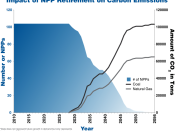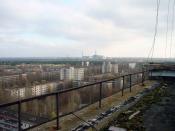Understanding the Benefits of Nuclear Power Nuclear power, or atomic power, is the most powerful form of energy known to man. The fissioning of one short ton of uranium fuel would produce as much energy as 3 million short tons of coal (Weinberg 448b). Nuclear power is also a cleaner way of producing electricity than fossil fuels, and produces much less pollution (Weinberg 448b). It is estimated that by the year 2000 one-third of all electric power generated worldwide will come from nuclear power plants ("Nuclear power" Encyclopedia Britannica 2003). Nuclear power is a good source of energy, and with new advances in technology, nuclear power should be a safe way of creating electricity in the future.
Nuclear power was first discovered by French Physicist Antione Becquerel, when he discovered natural radioactivity in 1896. Soon after, British Physicist James Chadwick discovered the neutron (Weinberg 448L). Rapid advancements were made in the field of nuclear power beginning in the early 1900's, when scientists began to make important discoveries concerning matter and energy.
Scientists already knew that all matter consisted of atoms, and later learned that atoms consist mainly of a nucleus that was held together by an extremely powerful force. When scientists discovered the force that held the nucleus together, they wanted to find some way to isolate and harbor that force (Weinberg 448L).
Early engineers in the field of nuclear energy were unskilled, and had to learn about nuclear-related subjects. These who entered the field were often educated in another branch of engineering, and had to be educated by nuclear scientists and physicists ("Nuclear power" Encyclopedia Britannica 2003). These men and women were true pioneers in an unknown industry. They had to "use untried methods on unseen substances with uncertain properties, unknown materials were to be refined by unspecified processes...


